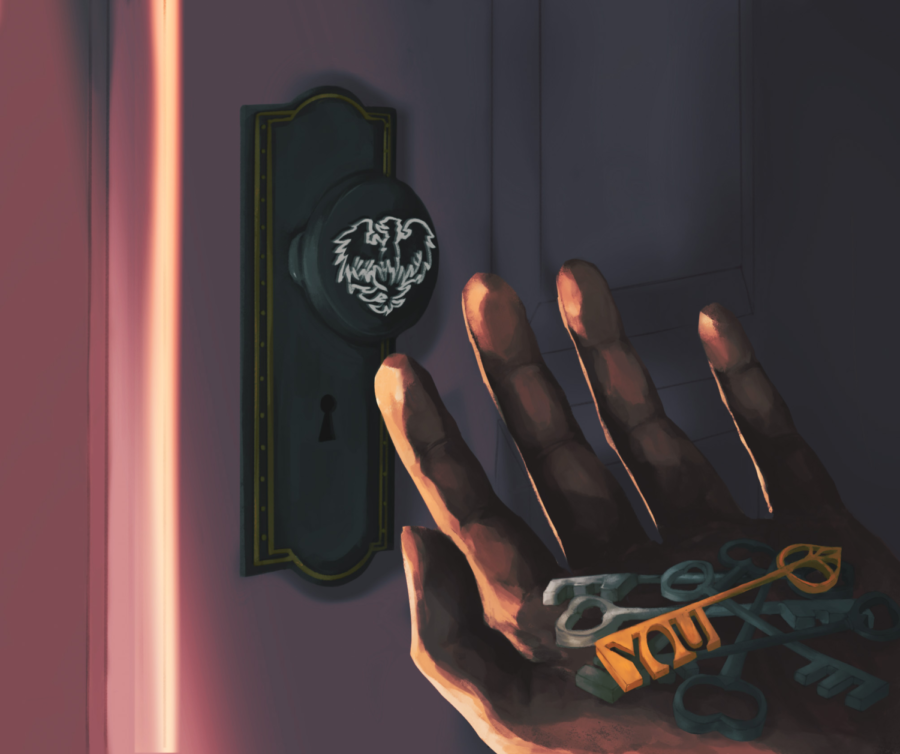Picture this: you’re about to start fall quarter at Zoom University: UChicago Edition. It’s your first year and you’ve bitten your nails down to the quick with worry. How will you make friends? Can a person maintain relationships in this type of college? Before the pandemic, back when you initially committed to the University of Chicago, you knew navigating the [infamous lack of] social life at this school would be a challenge—and now you have to do it almost entirely over Zoom? Without parties or RSOs or full-capacity dining halls, dorms, or classrooms? It seems almost impossible.
I’m here to emphasize that “almost.” Making friends at this school, virtually or otherwise, is very possible, but it becomes infinitely easier once you get used to leaning into the discomfort of taking risks. As someone who has struggled to find their place at this school, I’ve spent a lot of time making and maintaining friendships—even during quarantine. I know plenty of people who have stayed in one large group of friends since O-Week, but that’s just not how it’s worked out for me. Instead, I have pockets of close friends across campus who, often, don’t know each other. These relationships have changed in almost every quarter I’ve spent at UChicago—some have grown stronger, some have ended, some have connected in surprising and lovely ways—but the constant is that every quarter has brought new friends into my world. I have come to appreciate this state of flux, but it means that, in terms of friendships, every quarter reminds me of my first.
All of us wondered what this past spring’s virtual schooling would mean for our relationships. Going online was especially daunting for people who, like me, rely on the new connections they make each quarter. Now, I imagine going into a mostly online fall is especially daunting for you all: incoming first-years who are just starting their UChicago journey. Our first virtual quarter left me wanting to give one main piece of advice to those first years, and to anyone else wondering how to make friends during an exceptional term at UChicago: take risks.
This doesn’t mean sneaking a cat into housing or trying pineapple on pizza (And realizing it’s delicious. Because it is.). It doesn’t mean biking without a helmet, going to a non-socially distanced party, or putting expired milk in your pancakes. By “take risks,” I mean pretend you’re still on campus, but do it virtually.
Any other quarter, when someone said something interesting in class you could go up to them afterward and chat. You could ask people to grab coffee or lunch or if they wanted to study together. RSO meetings, intramural sports, and house lounges offered ready-made opportunities to get to know people. Now that we all go to ZoomU, in-person class experiences are mostly gone, campus coffee shops probably won’t reopen in the fall, and reduced-capacity dining halls aren’t really an option for hours-long chats. Does this mean we should throw up our hands and write off this quarter as one where we don’t make any new connections? Absolutely not.
My risk-taking, friend-making advice boils down to one very simple phrase: slide into their DMs. Why is this a risk? You already know one of the answers. We’re Gen Z, and in the pre-pandemic world, we assumed that Person X DMed Person Y because they wanted to hook up with them or, at the very least, because they found Person Y attractive. If you decide to (platonically) message someone now, you accept the risk that they think you’re hitting on them. (I’m not going into non-platonic messaging. UChicago hookup culture is proof that y’all have got that covered.)
Now, it’s important to note that many people reading this, especially female-identifying and gender-nonconforming students, have received genuinely creepy DMs. Those messages often masquerade as platonic interest at first, which is something you should definitely be aware of when doing your sliding. It’s helpful if you have some connection to the person beforehand (like a class or mutual friend), and a message based on mutual interest or shared experience works best: “I also have a German Shepherd! What’s her name?” or “Your embroidery’s beautiful! I just started getting into needlework…do you have any tips?” If they put questions or polls on their Instagram story, responding to those can be a great option, too. These might seem like super basic ideas, but they’re non-threatening and allow the person on the other end to decide whether to answer and, if they do, whether to use that response as a way of continuing the conversation.
In case you were wondering, this advice is based on personal experience. Since quarantine began, I’ve done quite a bit of DM-sliding with messages like the ones in the previous paragraph. One example: a person I’d never actually spoken to but had been aware of through social media and mutual acquaintances, posted on Instagram that they were considering watching Avatar: The Last Airbender when it came to Netflix. I DMed them immediately, asking both why on earth they hadn’t seen it yet and also that they keep me posted on their progress and reactions. They responded (and ended up loving the show) and we’ve had some lovely conversations since then. Before that DM, I only knew this person peripherally, but now, even though we still haven’t met in person, we’ve become friends. There was definitely a risk that they would think my message was intended as a come-on, but that’s a risk I’m glad I took. They, along with almost every other person I’ve reached out to over social media, have turned out to be someone I’m excited to see in person when campus reopens.
Misconstrued intention is just one risk of sending a DM; I’m sure you’re thinking of the others as you read this. What if you message someone from one of your classes and they just…never respond? And then you have to see them every class for the next however-many weeks? But, conversely, what if they do respond? We all know gauging someone’s tone over text is next to impossible at first—what if you embarrass yourself? Or offend them? Worse still, what if you get along great virtually only to find out later that you don’t click in person?
Despite all these potential pitfalls, I still advocate taking the risk and sending the message. If someone says something interesting in your Zoom class, find their Facebook or Instagram and send them a friend request. If they accept and reciprocate, strike up a conversation. It might feel weird at first, but it’s one of the only ways to mimic the post-class chats you might have had before the pandemic. Or, if this seems like too much for you, make a group chat with people from classes or RSOs. Ask if they want to FaceTime or Zoom to play a game or watch a movie—being face-to-face, even virtually, can help the interaction feel more meaningful than written messages.
If you’ve read this far and don’t believe that someone can actually make lasting friendships this way, that’s okay. But my own experience during spring quarter is proof that you can. I was just as nervous as you will be to send that initial message, but, I promise, meeting someone new is worth it. Learning about their life, their interests, developing the friendship over the course of the quarter will keep you feeling in touch with the UChicago community, no matter where you are in the world. We all know that college is about far more than academics—it’s about new experiences and late-night conversations and adventures, but, most of all, it’s about the people you share those moments with. Don’t let the coronavirus take away the joys you can and should have at UChicago this quarter. Take the risk. Send the message. Make the friend.
Elizabeth Winkler is a third year in the College.












